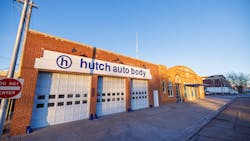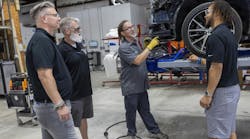Time to Grow
“You’re either growing or you’re dying,” or so goes the popular business saying. While one can certainly enjoy same-store sales growth, increasingly, collision repair shops are becoming multi-shop operators (MSOs.) In fact, 26% of respondents to the 2023 FenderBender Industry Survey reported they are MSOs.
But when is it time to either expand the building or to add another location? And what’s the best way to add an additional location: Acquire an existing body shop, build from the ground up (greenfield), or convert an existing building (brownfield)? For the two shop principals we interviewed for this article, that varies, depending on market conditions and what’s available.
Ken Hunnell, who spent the better part of nearly 20 years working for regional MSOs in Kansas, was ready to strike out on his own at the end of 2019. For his first shop, an acquisition of a shop in Enid, Oklahoma, provided immediate cashflow.
“I bought an existing shop at the beginning of 2020,” he says, “so, it was not exactly the best time to buy a shop. But in spite of COVID, we still grew. In 2020, we were up 40% from the $1 million per year the shop had been doing. And then in 2021, we doubled what we’d done the year before. We’re on track this year to clear $4 million. So, I’m proud of the growth there from what it had been doing.”
Hunnell just opened his second shop in November in Hutchinson, Kansas, after months of renovation of a historic building, with his sights set on additional locations down the road, with a preference for acquisitions.
“I just feel like I can bring some systems and processes in to help. Especially in some of these smaller markets, the shops are just not performing at the level they could be, so I feel like I can turn those around fairly quickly.
Eustis Body Shop, with six locations that span about 200 miles along I-80 in Nebraska, has grown from its first Eustis, Nebraska, location in 1979 using a mix of all options, says Vice President Ryan Clark.
“We’ve done them all. We’ve done a greenfield, we’ve done an acquisition, and we’ve done a brownfield,” says Clark, who is the son-in-law of owner and founder Doug Keller, noting that when possible, Keller prefers greenfield construction over an acquisition.
“He can design it and build it how he wants and buy the equipment he wants instead of fixing all the unmaintained equipment and having to buy new, anyway.”
Ready for a New Beginning
Hunnell began his collision repair career in 2001 working in the parts department for a regional MSO in Wichita, Kansas. He came to All Angles Collision, also in Wichita, in 2009, which at the time had just one shop doing a mix of restoration work and collision repairs. He says he helped convert the shop to a focus on collision repairs and later implemented lean production processes and team-pay systems. The company began a growth spurt in 2015 with the opening of its second location, growing to five locations before Hunnell struck out on his own in late 2019. (Crash Champions acquired All Angles in June 2021.)
“I think they finished 2019 with about $13 million in sales,” he recalls. “I was overseeing all five locations, and they were getting ready to start the construction of their sixth. So, I felt like it was a good time for me to leave without getting in the middle of a bunch of big projects. I was ready to have my own shop and was very thankful for the opportunity there.”
Hunnell had signed a non-compete agreement with the company that limited how close to Wichita he could operate. But the decision to buy the shop in Enid, a nearly two-hour drive southwest of Wichita, was driven by his wife’s roots in the area, not a restriction in the agreement.
“My wife is from the area, and her parents live outside of Enid, so I stay with them a couple days a week,” he says. “My son’s mom lives in the small town I live in. He’s a junior in high school, and my wife and I knew we weren’t going to move until he was out of high school.”
Once he had operations running smoothly enough in Enid to allow him to leave it in capable hands several days a week, Hunnell found a gem of a building in downtown Hutchinson, a town he’d previously planned to expand to and had the foresight to “box out of” the non-compete agreement. The historic building has the distinction of being the second franchise in the country for the Yellow Cab Co., Hunnell says, as well as a history of hosting service and repair operations for ambulances and buses.
“My wife and I are always driving around lots of old downtowns, and you’ll see where an old dealership used to be, or something like that. We fell in love with this one once we saw it. It’s actually a historical landmark building on the face of it.”
The free-span 22,000-square-foot building was essentially an empty warehouse that required three-phase electrical service to be brought into the building and throughout, a new paint booth, and heating and air conditioning, the latter of which Hunnell says helps to attract technicians. The shop opened to write estimates on Nov. 6.
Preparing to Expand
Hunnell says he was looking for additional expansion locations soon after he bought the Enid location. But to get to that point, Hunnell says, he first needed to be able to get it running smoothly on its own. Larry Baker, owner of Baker Collision Express, is Hunnell’s mentor, and the two conferred for an hour once a week.
“We were doing well with our processes, but we just didn’t quite have the right people in the right place and the leadership for me to be able to not be there as much,” he says. “In the spring of 2022, I looked at some of the people we had in the business and realized they didn’t all align with who we were and what was important to us. And so I knew we needed to make some changes.”
The transition was “tricky,” Hunnell admits, but it resulted in a staff of “high-quality people that fit very well with what we’re doing.”
“So now, I could start looking again at buying a location, and I've looked at some existing shops. I made a few calls, but I didn't really try hard. It's a small market, so there's not going to be a ton of opportunity. There's not going to be 20 shops to go see who might be interested in selling. But I was ready to grow, and so I just started driving around looking at buildings and found this little yellow sign that said ‘For rent’ and thought, ‘Man, this thing looks awesome. I’d better call them.’ And then when they said the price, I was like, ‘Yeah, that seems really reasonable for the rent. I think I could swing that.’”
Duplicating Success
With money borrowed from his grandfather, Keller started his first shop in Eustis, a village of about 400 people, Clark says. Keller had community support, but a couple years later, he realized that although he knew how to fix cars, he didn’t really know how to run a business. Going to school at night, he earned his MBA. (Of 2023 FenderBender Industry Survey respondents, 2% reported having earned a master’s degree.)
“And that was really what got him to understand business, to understand break-even analysis and realize that if he wanted to provide for his family like he had dreamed of, he was going to have to expand, because that one small location wasn't going to cut it.”
Along with his first employee – also his cousin and one of his best friends – Keller rented a little shop about 25 miles away at a car dealership in Lexington, Nebraska. But operations were restrictive, so he bought property and built a new spot for that second location, which opened by 1986.
“His righthand man and best friend was running that Lexington location. And he realized that management is key in continuing to grow. And they got together and said, ‘Hey, let’s do this again.”
In 1991, they looked at other markets, with their sights set on Grand Island, a sizable market of about 40,000 people at the time. Through his membership in the trade association, Keller knew a member with two locations looking to sell. He bought both, combining operations into one location and selling the other. Meanwhile, Kearney was booming, Clark says, and once Keller had someone ready to manage an additional location, he built a greenfield location, which opened in 1997.
“Doug attributes everything to his management team and having people willing to take over,” Clark says. “He’s never once built one and said, ‘I hope people come.’ He’s had people online to have that growth from within. And that’s probably why he’s been so successful.”
The Cozad shop came up for sale in 2006, making it number five in the Eustis family.
Looking to Lincoln
Keller was looking toward retirement, Clark says. “And then I came along and married his daughter.” Clark had gone to college to be a scientist, which had been his profession for five years. But he was “bored and loved cars,” while at the same time making more money doing “side hustles” and business ventures with his friends than as a scientist. On a golf outing, Keller asked Clark if he’d ever considered working in the business. Clark was skeptical. “I was like, ‘I’m not a blue-collar guy.’ And he kind of brought me in and showed me a few things. ‘If you’re interested, let’s try it.’ So, I talked to my wife, switched careers, and moved up to Eustis for a year while my wife lived in Lincoln.”
Clark says he learned the trade from the ground-up, from the detail bay to disassembling cars. Keller next tasked him with restoring his personal 1987 Chevy pickup, Clark’s first project.
“The guys in Eustis were super willing to help me grow,” he recalls. “I think they saw the business side of me, but they didn't know if I'd be able to do the manual labor side. And what I learned from that big project is we are not in the rust restoration business. And we are that way for a reason.”
Clark would soon find his way back to Lincoln, as Keller had been receiving a lot of phone calls from customers asking him to consider expanding to the capital city, where many of their kids were going to school at the University of Nebraska-Lincoln.
“In 2017, we started the dirt work, and in 2018, the doors opened. I moved back to Lincoln and started running that business.”
To decide where to buy land, Clark says the two worked with their paint company, which is a service Hunnell also used to show if an area is saturated or can support more business.
And Eustis is in growth mode again.
“We’re exploring different areas,” Clark says. “Doug is still a greenfield guy. The hard part is the real estate. It wasn’t that expensive before to buy a lot of land and put up a metal building. Now it is. So, it’s starting to flip for commercial real estate to just buy the property or an existing business. You really have to do an analysis of what’s more effective for your business.”
Clark says he and Keller are exploring both options and have looked at multiple properties. Prospects have also reached out to them.
“With real estate being so high, we're kind of shying away from building, so we're kind of more listening to body shop owners who are looking to sell,” he says. “We know the big consolidators are in the market, because they call us all the time, too. But once people know we’re in growth mode, they come to us. We can’t offer what a big MSO is offering, but we do have the family atmosphere, the small-town feel, or at least we hope we do, compared to the big corporate culture. And so when we’re discussing this with other body shop owners, that’s what we pitch to them, that we are still a family business.”
A greenfield is not out of the question for Eustis’ next move, though.
“But that being said, we do have eyes on this piece of property,” Clark says. “We're working with the city to see if it would work. So, we're open. Nebraska is kind of our main focus, though.”
Staffing for Growth
To get Enid to grow within its four walls, Hunnell had to work on his staffing roles levels, currently at 18. Baker helped him realize in retrospect that while he was running All Angles, he had been running an administrative staff that was leaner than it should have been.
"We were expecting a lot out of our team in those roles, and it really limited our growth, in hindsight, of not having enough people in the right admin roles. As an owner or a manager, I’m willing to do whatever it takes. But a lot of the staff, they’re going to get to a certain point of ‘enough is enough.’ It’s going to hinder you more than it’s going to help. When you get people to that point, no matter how well they’re working, they’re still just never going to feel like they’re catching up or accomplishing anything. And so instead of having just one damage analyst, when we added another writer in the shop, it really helped balance that a lot. And we have two CSRs up front and one sales manager. We really have a good balance. We’re operating at a much busier level than we have been, but it doesn’t feel as busy because it’s much more manageable.”
Getting those staffing levels fine-tuned has helped him plan for the new shop in Hutchinson, Hunnell says, beginning with seven staff at the start.
“I’m pretty excited about the crew that we're putting together in Hutch because they're starting out with probably some of the best of the best based on my background and knowing how I operate shops and what we do. I think in a healthy way, they're probably going to compete a little bit with Enid. It's all about communication when you’re building teams. That's what I love about team pay systems and that is just the team aspect of a basketball team or a football team or whatever. The best teams communicate well, and they hold each other accountable.”
Respondents to the 2023 FenderBender Industry Survey cited finding qualified workers as the number-one challenge facing the industry. To Hunnell, the national staffing shortage of experienced technicians can be mitigated by specialization, such as having a disassembly technician and a reassembly technician, not leaving an enthusiastic person hopeful for a technician position languishing as a detailer for a couple years with no prospect of advancing within the organization.
“Our system allows us to be able to get quite a bit out of less experienced technicians,” he says. “I think some of the technician challenges we’ve faced over the years are self-inflicted because we were looking only for experienced technicians and weren’t giving a chance to some of these young guys who wanted to do it.”
For Eustis, further expansions provide growth opportunities for its people, Clark says, adding that the company shares in its success by selling shares in the company to its employees. More than a third of them currently have taken advantage of that.
“We’re growing now more for growth opportunities for our people,” he says. “We want to retain them, whether that be for a new management position, or regional manager or the accounting side of things; it doesn't have to necessarily just be the technician side. And we found that when we grow, that's what people want; they want a career path. And that's kind of what we're offering. We want to promote a good atmosphere by having a big enough company that people can move up into different roles.”
Similarly, Hunnell looks for managers of his future expansions to have more skin in the game.
“My vision is to develop Christ-followers into successful business owners leading with integrity, wisdom, and adaptability,” Hunnell says. “So what I envision long-term is finding these managers and people who want that and really understand who we are, what we do, and want to be that you know have that shop. These managers can develop ownership but are there at that facility.”




